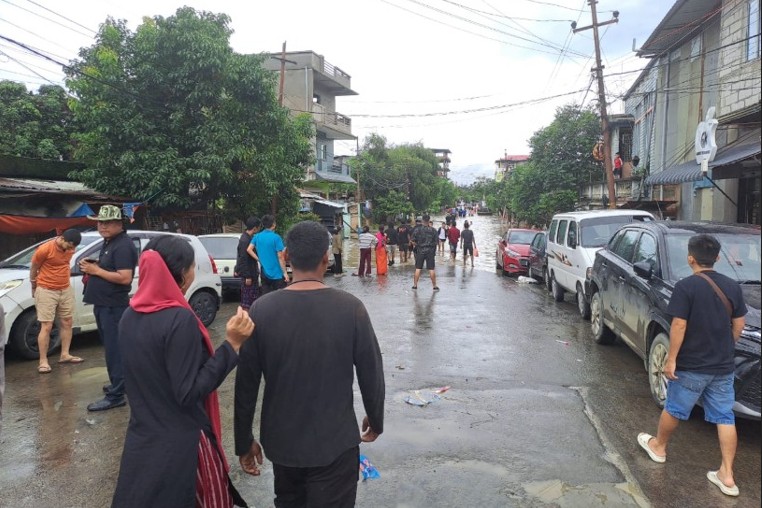I wonder why we are so okay with the idea of standing still as a mere spectator at times that do not demand any form of spectatorship. Imphal is flooded currently, the flood scene and the volatility expanding rapidly.
As I stumbled across a video reportage about the Imphal floodings via a YouTube channel of ‘NEw TV’, a local news platform, the reporter was furious and lamented the reality of Imphal. The reality here being the fact that there weren’t enough manpower and help in building a structure to act as a flood barrier at the point of overflow at Nongpok Thong area in New Checkon.
The few men that the concerned government officials have sent to look after the situation along with the few men who had arrived at the point who were volunteering to aid in an effort to stop the overflow were not enough in that situation and as those men were trying relentlessly to tackle the situation, many individuals came by amongst the chaos just to be mere spectators even some proudly claiming that they came for the show on being interviewed.
The reporter wailed on how the situation would have been a bit better if these mere spectators can also aid in that effort to control the water overflow. The idea of “esing chaoba yengba thokpa” is a tragedy if we must consider, the ability of turning almost everything into a kumhei in our soil needs a reconsideration.
What is the sadistic pleasure which has been derived from being a spectator of the griefs of those families and individuals who have been running to and fro to save some pieces of their belongings from the scourge of the flood? And as observed in some instances, houses which are low lying were wholly washed away by the flood. Despite all this, to be able to come out and watch as if it is a delightful grotesque show is nothing but a tragedy and a reflection of the fault lines in the sense of community and belongingness that we have in the region. Not to be overly pessimistic or that sort but a personal observation.
Nonetheless, has everyone been like this in Imphal yesterday? The obvious response would be a blunt NO, despite the culture of spectatorship, many people did come out to extend help and provide assistance in handling the chaos, the local club members, youths, police personnels, etc., etc. But the fact that there is an existence of this culture is a wake-up call to investigate how the idea of extending help and assistance has been bartered amongst us.
Has everything been taken so superficially these days that the politics of belongingness has also become a mirage? Until something becomes involved or must be associated with a high and mighty idea of “I” or the self, it seems that we have forgotten to join in this collective politics of community building and social cohesiveness. This politics is essential, a tool through which we are to be resilient with whatever chaos and conflicts that must come upon us. When this exchange is wounded up, everything would become performative and because of that performativity itself, we still cannot come into a sense of ‘us’ and what this ‘us’ stands for.
Moralities become so superficial with this performativity that it requires an external agent to show to or to prove to in order to perform something sensible with the spirit of ‘us.’ This in turn affects every social transaction we are to have. The normalisation of the culture of being mere spectators is paving ways for the normalisation and gradual social acceptance of things that do not have any sound morality, well morality in a general humanitarian understanding as morality is subjective and to define a sound morality is to limit the idea itself. When things as such have been normalised to an extent, there will be blurred lines on when to speak up against a certain injustice or prejudice in front of us and a crave for an external validation for our performativity.
Note: For reference purpose, I have added the link of the video reportage that I have mentioned in my writing here.
https://youtu.be/G7oNUycLM8A?si=SUwUyb7V5AvRl7IY

The writer is pursuing a Masters course in Development Studies at the Ambedkar University, New Delhi.











